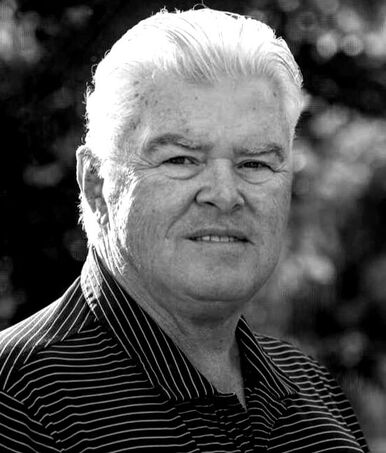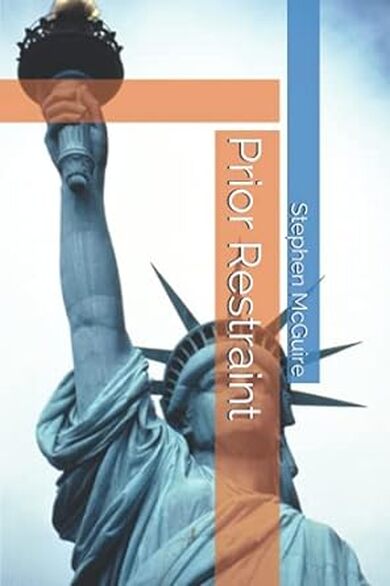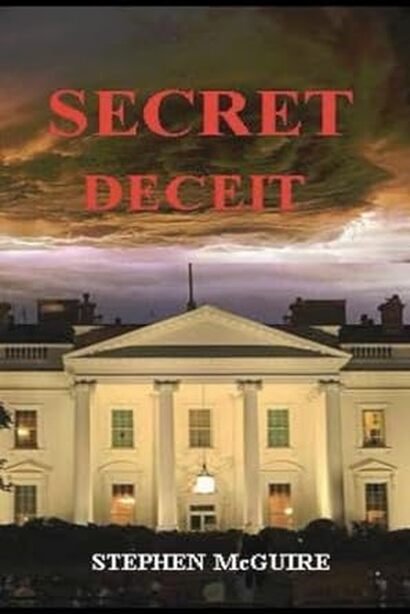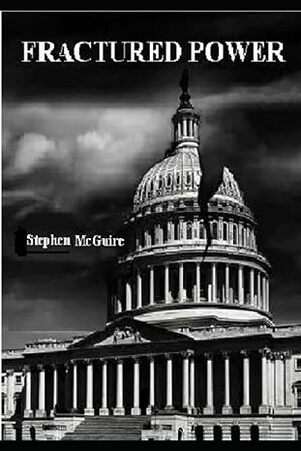
It's with great pleasure that I welcome Stephen McGuire onto the website today. Stephen has enjoyed a distinguished career in the law as an attorney and federal judge in Washington D.C. Since retiring, he has turned to writing and to date has penned three political thrillers.
Alex: Tell me a bit about yourself, Stephen.
Stephen: I was born in Louisville, Kentucky, and graduated from the University of Kentucky and South Texas College of Law. My interest in writing is attributed to two things: First, I stuttered as a kid and couldn’t always say what I wanted without being self-conscious. I began to write my thoughts down and soon discovered when I wrote I could say anything. Secondly, my writing skills were also enhanced by my high school English teacher. Writing skills are imperative for a judge, but now that I'm retired, I joke that I can write, whatever I want without having every word scrutinized by a U.S. Court of Appeals.
I had a thirty-plus year legal career serving as an attorney and a federal judge in Washington, D.C. I retired in 2008 as the Chief Judge of the Federal Trade Commission (FTC). Prior to FTC, I was an Administrative Law Judge at the Social Security Administration and the Environmental Protection Agency. After I retired from the federal government, I became Vice President for Corporate Compliance at the University of Louisville Hospital.
Alex: Tell me a bit about yourself, Stephen.
Stephen: I was born in Louisville, Kentucky, and graduated from the University of Kentucky and South Texas College of Law. My interest in writing is attributed to two things: First, I stuttered as a kid and couldn’t always say what I wanted without being self-conscious. I began to write my thoughts down and soon discovered when I wrote I could say anything. Secondly, my writing skills were also enhanced by my high school English teacher. Writing skills are imperative for a judge, but now that I'm retired, I joke that I can write, whatever I want without having every word scrutinized by a U.S. Court of Appeals.
I had a thirty-plus year legal career serving as an attorney and a federal judge in Washington, D.C. I retired in 2008 as the Chief Judge of the Federal Trade Commission (FTC). Prior to FTC, I was an Administrative Law Judge at the Social Security Administration and the Environmental Protection Agency. After I retired from the federal government, I became Vice President for Corporate Compliance at the University of Louisville Hospital.

Alex: How would you describe your writing, and are there particular themes that you like to explore? And how did your career influence your writing?
Stephen: All three novels, Prior Restraint, Fractured Power, and Secret Deceit are all about power and greed in Washington, D.C., and it's not particularly pretty. Living and working at very high-levels of government in Washington, I learned how political power is exercised on Capitol Hill. My writing has also been influenced by my extensive travels throughout the world. I have traveled to over sixty-five foreign countries, including ten communist countries. Among my more memorable trips were those to Cuba (where my letter about the culture and lifestyle of Havana was published by Cigar Aficionado magazine), Africa, India, Vietnam, and Japan. In July 2019, I taught English to high school students in the Fujian Province of China.
Alex: Are you a writer that plans a detailed synopsis or do you set out with a vague idea and let the story unfold as you write?
Stephen: I develop an overview plot line and have a vague idea of how the story will end, but allow the characters to move the story forward. I think the ability to develop the characters to the greatest degree possible is one aspect of a really good writer. In my novels, the reader not only knows who the characters are, but understands their disparate points of view as I might go back in their pasts, sometimes even to their childhood and show the reader what major experiences they have encountered that helped shape why they are the person they are.
Stephen: All three novels, Prior Restraint, Fractured Power, and Secret Deceit are all about power and greed in Washington, D.C., and it's not particularly pretty. Living and working at very high-levels of government in Washington, I learned how political power is exercised on Capitol Hill. My writing has also been influenced by my extensive travels throughout the world. I have traveled to over sixty-five foreign countries, including ten communist countries. Among my more memorable trips were those to Cuba (where my letter about the culture and lifestyle of Havana was published by Cigar Aficionado magazine), Africa, India, Vietnam, and Japan. In July 2019, I taught English to high school students in the Fujian Province of China.
Alex: Are you a writer that plans a detailed synopsis or do you set out with a vague idea and let the story unfold as you write?
Stephen: I develop an overview plot line and have a vague idea of how the story will end, but allow the characters to move the story forward. I think the ability to develop the characters to the greatest degree possible is one aspect of a really good writer. In my novels, the reader not only knows who the characters are, but understands their disparate points of view as I might go back in their pasts, sometimes even to their childhood and show the reader what major experiences they have encountered that helped shape why they are the person they are.

Alex: Tell us about your latest novel.
Stephen: My third novel recently published, is Secret Deceit. Secret Deceit is a pulsating thriller about a coup to assassinate President David Edwards whose aggressive legislative agenda, backed by broad popular support, poses an ominous threat to the corporate greed of a major American industry. Secret Service agent Anthony Russo, a Special Forces veteran assigned to the president’s protection detail, unknowingly puts his life in jeopardy when his own investigation into the president’s death implicates a corrupt U.S. Senator and other White House officials in a twisted, devious plot to preserve billions of dollars in unfettered greed.
Alex: How much research do you do and what does it usually entail?
Stephen: I spend a great deal of time conducting research that makes the novels seem so real. I examine locales, history, medical conditions, geography, and local culture to capture dialogue and scenes in order to transport the reader to the action taking place.
Alex: Do you ever base your characters on people you have encountered in real life?
Stephen: I'm certain all writers are at least subconsciously influenced by people they've met. Although some of my characters might reflect attributes of people I’ve known, they aren't really based on any specific individuals in real life.
Stephen: My third novel recently published, is Secret Deceit. Secret Deceit is a pulsating thriller about a coup to assassinate President David Edwards whose aggressive legislative agenda, backed by broad popular support, poses an ominous threat to the corporate greed of a major American industry. Secret Service agent Anthony Russo, a Special Forces veteran assigned to the president’s protection detail, unknowingly puts his life in jeopardy when his own investigation into the president’s death implicates a corrupt U.S. Senator and other White House officials in a twisted, devious plot to preserve billions of dollars in unfettered greed.
Alex: How much research do you do and what does it usually entail?
Stephen: I spend a great deal of time conducting research that makes the novels seem so real. I examine locales, history, medical conditions, geography, and local culture to capture dialogue and scenes in order to transport the reader to the action taking place.
Alex: Do you ever base your characters on people you have encountered in real life?
Stephen: I'm certain all writers are at least subconsciously influenced by people they've met. Although some of my characters might reflect attributes of people I’ve known, they aren't really based on any specific individuals in real life.

Alex: Which was the last book you read that blew you away?
Stephen: LA Confidential, by James Ellroy. Ellroy really captured the era of noir fiction of the 1950s and the corruption within the LA police department. He transported you to the scenes taking place by so beautifully capturing the ethos of the times and the many societal facets of life in LA.
Alex: How do you market your books?
Stephen: My wife, Doris retired as a special agent and now she is my marketing agent. She has done a great job of scheduling me for speaking engagements, radio, podcast and newspaper interviews. In the past several years, I've had over sixty speaking engagements at bookstores, libraries, country clubs, civic associations, and art centers. I've appeared on twenty-one radio shows/podcasts and been featured in numerous newspaper articles around the country.
Alex: What are your interests aside from writing? And what do you do to unwind?
Stephen: I enjoy spending time with my wife, Doris, and our dogs Henry, a golden retriever, and Alfie, a mini goldendoodle. I still engage in some foreign travel as the opportunity arises. Also, I am interested in classic cars, including my classic corvette.
Alex: Which authors do you particularly admire and why?
Stephen: I previously mentioned James Ellroy. I also admire Jon Krakauer, who wrote Into Thin Air about a climbing disaster on Mt. Everest. He captures the climbers under extreme treacherous mountain weather conditions and his description of the events makes the reader feel they are on the side of the mountain. I also admire David Baldacci for his descriptive writing of places in the story. Richard Condon who wrote The Manchurian Candidate, and Mark Bowdon who wrote Black Hawk Down and Hue, beautifully tracked my travels in Vietnam and make for compelling reading.
Alex: Thank you so much, Stephen for sharing this with us. It's been wonderful to have a former American judge here. We have had a couple of former attorneys and one English judge, so you are in good company. I look forward to getting stuck into Secret Deceit.
Stephen: Thank you, Alex. It's my pleasure.
Stephen: LA Confidential, by James Ellroy. Ellroy really captured the era of noir fiction of the 1950s and the corruption within the LA police department. He transported you to the scenes taking place by so beautifully capturing the ethos of the times and the many societal facets of life in LA.
Alex: How do you market your books?
Stephen: My wife, Doris retired as a special agent and now she is my marketing agent. She has done a great job of scheduling me for speaking engagements, radio, podcast and newspaper interviews. In the past several years, I've had over sixty speaking engagements at bookstores, libraries, country clubs, civic associations, and art centers. I've appeared on twenty-one radio shows/podcasts and been featured in numerous newspaper articles around the country.
Alex: What are your interests aside from writing? And what do you do to unwind?
Stephen: I enjoy spending time with my wife, Doris, and our dogs Henry, a golden retriever, and Alfie, a mini goldendoodle. I still engage in some foreign travel as the opportunity arises. Also, I am interested in classic cars, including my classic corvette.
Alex: Which authors do you particularly admire and why?
Stephen: I previously mentioned James Ellroy. I also admire Jon Krakauer, who wrote Into Thin Air about a climbing disaster on Mt. Everest. He captures the climbers under extreme treacherous mountain weather conditions and his description of the events makes the reader feel they are on the side of the mountain. I also admire David Baldacci for his descriptive writing of places in the story. Richard Condon who wrote The Manchurian Candidate, and Mark Bowdon who wrote Black Hawk Down and Hue, beautifully tracked my travels in Vietnam and make for compelling reading.
Alex: Thank you so much, Stephen for sharing this with us. It's been wonderful to have a former American judge here. We have had a couple of former attorneys and one English judge, so you are in good company. I look forward to getting stuck into Secret Deceit.
Stephen: Thank you, Alex. It's my pleasure.
